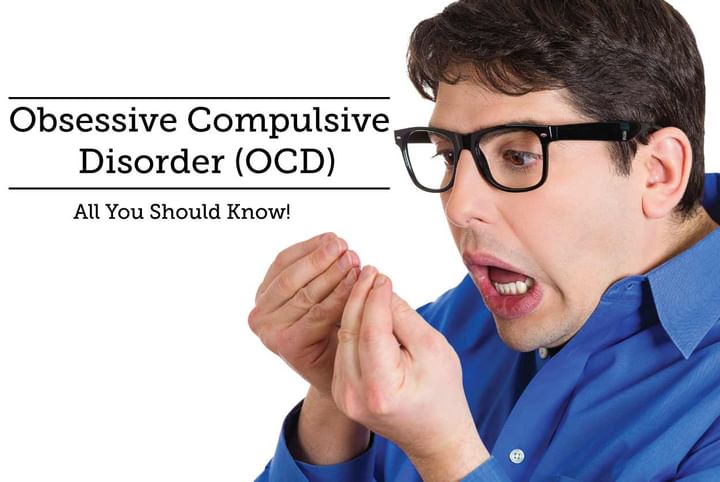Obsessive Compulsive Disorder (OCD) - All You Should Know!
Shannon L. Alder once said, “Sensitive people usually love deeply & hate deeply. They don't know any other way to live than by extremes because their emotional thermostat is broken.”
Sometimes certain thoughts & habits become so addictive at times that even while being aware of its futility the person fails to resist from indulging in it. Obsessive Compulsive Disorders can be extremely debilitating & can easily thwart subjective well-being. The main features of this illness are obsessions and compulsions.
Obsessions are certain thoughts, doubts, images or urges that occur in one's mind. These are unwanted, repetitive by nature. Most people with OCD realize that obsessions are senseless, irrational, or excessive, but they are unable to ignore or suppress them. They would attempt to resist and control them, but would not succeed. Obsessions cause significant distress and anxiety to the sufferers and as a result cause interference in their day to day functioning.
Compulsions are repetitive acts that the person is driven to carry out in spite of knowing that they are meaningless, unnecessary or excessive. Compulsions are usually in response to obsessions. For example, a person with an obsessive fear of contamination washes hands repeatedly in order to ensure that his or her hands are clean. The person attempts to resist repeated hand-washing, but gives in to the urge so as to relieve him or herself of the anxiety or discomfort. Persons with OCD often perform certain acts repeatedly to avoid some dreaded event or to prevent or undo some harm to themselves or others. For instance, touching the floor even number of times to prevent an accident.
They are aware most of the time that the activity is not connected in a logical or realistic way with what was intended to be achieved, or that it may be clearly excessive (as in the case of hand-washing compulsions), but cannot control them as they reduce anxiety, at least transiently.
Common Symptoms in OCD:
Some common obsessions-
- Fear of getting dirty, contaminated or infected by persons or things in the environment.
- Blasphemous thoughts.
- Thoughts of harming or killing others or oneself.
- Doubts that a task or assignment has been done poorly or incorrectly.
- Recurring thoughts or images of sexual nature.
- Fear of blurting out obscenities.
- Fear of developing a serious life-threatening illness.
- Preoccupation to have objects arranged in a certain order or position.
Some common compulsions:
- Repeated hand-washing, taking unusually long time to bathe, or cleaning items in the house.
- Ordering or rearranging things in a certain manner.
- Checking locks, electrical outlets, gas knobs, light switches etc. repeatedly.
- Repeatedly putting clothes on, and then taking them off.
- Counting over and over to a certain number.
- Touching certain objects in a specific way.
- Repeating certain actions, such as going through a doorway.
- Constantly seeking approval (especially children)
What are not obsessions?
The common usage of the word obsession as in, “he is obsessed with music” is not an obsession as used in the context of OCD. Here the person indulges in the activity with complete will, has control over them and derives pleasure out of the activity.
When one is fired from a job or loses someone close to them, it is natural to brood over the event. However, these thoughts are not considered as senseless or irrational, though they may cause some discomfort. Similarly, a person appearing for an examination may feel anxious and worry about the results, which could occupy considerable amount of his time. These thoughts, though unwelcome, are under his control and not experienced as senseless. The above experiences are obviously not obsessions. The common usage of the word obsession as in, “he is obsessed with music” is not obsession as used in the context of OCD. Here the person indulges in the activity with complete will, has control over them and derives pleasure out of the activity.
Treatment:
Your clinical psychologist might subject you to anyone from a variety of treatment strategy available based on the severity of the condition and course of illness. Client specific psychological treatment is recommended according to unique triggers and patterns of obsessions/compulsions.
Cognitive Behavioral therapy comprises of a variety of techniques used to modify or replace maladaptive thoughts, emotions and behaviors with more adaptive forms of the same. Obsessions and compulsions seen in OCD are examples of maladaptive behaviors as they cause significant distress and interfere with normal functioning of an individual. Behavior therapy helps to remove obsessions and compulsions and thereby ameliorate the distress.
In treating OCD several CBT techniques are used. One of them, “Exposure and Response Prevention (ERP)”, is the most effective and widely used technique.



+1.svg)
